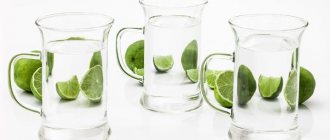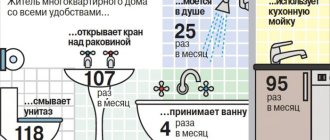From this article you will learn:
- What is the importance of drinking water for the body?
- What is the right water to drink?
- How to stay hydrated throughout the day
- How to calculate drinking water consumption rates
- What types of drinking water are there?
- How to drink melt and lemon water
- Why is it good to drink water on an empty stomach?
- What is the importance of water for weight loss?
- How to drink during exercise
- Why you shouldn’t drink during and after meals
- Why you can't replace water with other drinks
- How carbonated water is harmful to the body
The human body consists of almost 60–70% water. Liquid is one of the strongest solvents of all harmful substances entering the body and a catalyst for metabolic processes. When it arrives in sufficient quantities, all tissues and organs work at full capacity, because metabolic products are excreted on time, and metabolic processes proceed quickly. Therefore, a person must maintain water balance. From this article you will learn how to drink water properly and why it is needed.
Why is it important to drink water
With a lack of water, the kidneys do not function at full capacity, because they do not have enough fluid to absorb from the blood, process, dissolve and remove with urine all substances toxic to the body. This causes urine to become more concentrated, which over time can lead to the formation of kidney stones.
If the kidneys perform their functions poorly, then higher demands are placed on the liver, which is also an organ that neutralizes harmful substances. Because of this, the liver cannot properly process fat obtained from food and accumulated in the body into energy. All this leads to stagnation, which contributes to the formation of stones. In addition, the liver ceases to actively participate in fat metabolism, lipids begin to accumulate in the body faster, and the person gains extra pounds.
That is why it is important to know how to drink water correctly and how much, because when there is a lack of water in the body, an emergency mode of water saving is activated. As a result, the following phenomena are observed.
On the one hand, the absorption of water from the feces in the intestines begins. This causes constipation.
On the other hand, the body tries to accumulate fluid by any means, depositing it in the intercellular space, and this leads to the appearance of edema.
Recommended articles on this topic:
- How to check water quality: independently and in the laboratory
- Drinking water at home: health comes first
- Is it possible to drink tap water, and what should you be wary of?
It should be understood that taking diuretics will help improve a person’s condition only for a short time, since they act on the effect, and not on the cause that caused the edema. And no matter how strange it may sound, the best method of getting rid of puffiness is to learn how to drink water correctly and start consuming it in sufficient quantities. As a result, the body will stop storing fluid and swelling will gradually subside.
According to WHO, more than 80% of all diseases that affect humanity are associated with a lack of water in the body.
Many experts believe that constant water deficiency - chronic dehydration - is the cause of the development of many diseases, such as hypertension, bronchial asthma, obesity, allergies, depression and a number of other psycho-emotional disorders.
A constant lack of water gradually leads to significant disturbances in the body. There is a decrease in performance, drowsiness, fatigue, digestive disorders, etc. A dehydrated body begins to conserve fluid and reduces the speed of biochemical processes, as a result, blood viscosity increases, which, in turn, leads to the formation of blood clots. Problems also begin with the central nervous system, because the human brain consists of 75% water. Therefore, when there is a lack of fluid, stress occurs in brain cells, leading to decreased concentration, attention and memory impairment.
How water affects health
Water is involved in all biochemical processes of the body, such as:
- metabolism,
- digestion,
- hematopoiesis,
- regulation of blood pressure,
- thermoregulation,
- removal of toxins.
Disruption of these processes affects the condition of hair, skin, nails, as well as the functioning of all body systems, the musculoskeletal system, and the brain. No wonder doctors believe that dehydration can cause confusion and headaches. After all, the human brain is 75% fluid. It's the same with blood. The less water in our body, the thicker the blood and the higher the pressure. That is why hypertensive patients need to monitor their water balance especially carefully. When the body feels a lack of water, it begins to intensively produce histamine, a hormone responsible for the immune response in a situation that is alarming for the body. However, an excess of histamine activates not only the immune system, but also allergies. This is why maintaining a drinking regime for allergy sufferers is especially important. Water dissolves and delivers a variety of nutrients to tissues. Without water, normal functioning of joints and muscles is impossible. With its deficiency, the likelihood of arthrosis and osteochondrosis sharply increases due to the constant wear and tear of fragile cartilage tissue. People suffering from diabetes must control their blood sugar. Drinking a glass of water instead of juice or a sugary drink helps them keep their sugar levels under control. While drinks containing sugar can cause a sharp rise in its level in the blood and increase thirst.
Dehydration
When dehydrated, the body draws water from cells to maintain its most important functions. As a result, cell functionality is impaired. The blood thickens and moves more slowly, and accordingly, oxygen arrives with delays.
Signs that indicate you are not drinking enough water:
- feeling of thirst and dry mouth;
- dark yellow urine;
- peeling of the skin, cracks on it;
- headache;
- drowsiness and lethargy;
- cardiopalmus.
Unfortunately, at the very beginning, these signs may appear separately, not give an overall picture of the problem, or be attributed to the manifestations of other diseases.
Excessive fluid intake
Healthy adult kidneys can process up to one liter of water per hour. Anything more than this can be considered harmful and even dangerous. In ordinary life this practically never happens. However, under a number of circumstances this is possible, as a result of which a person may drink an excessive amount of water.
Excess water, that is, drinking more than 4-5 liters of water per day, is fraught with the following consequences:
- increased kidney function;
- increased protein breakdown;
- increased sweating;
- leaching of the necessary salts and disruption of the salt balance;
- diluting gastric juice and slowing digestion.
In addition, people with liver and kidney diseases should be more careful when drinking water. Excessive intake of liquids for them can be hazardous to health. In this matter, they need to strictly adhere to the doctor’s recommendations.
Tips on how to drink water properly
How much water should you drink per day? There is no exact answer to this question. If you are not accustomed to consuming large volumes of liquid daily, then you should not force yourself to drink. The rate should be increased gradually, over at least two weeks. Remember the basic rules:
- The body can get water from drinks and food. Enrich your diet with fresh fruits and vegetables.
- Feel your body and don't force yourself into the standard 6-8 glasses of water a day. Each person's needs are individual.
- It is correct to drink water in its pure form, because it does not contain extra calories, sugars, salts and any other substances that can negatively affect health.
- If you are going for a walk, drink water at home. During physical activity, it is correct to drink water in small portions, otherwise sweating may increase, which means dehydration will occur faster.
- During air travel, try to drink as much as possible, because the air in the aircraft cabin is very dry due to high pressure. Therefore, it is necessary to consume enough water to avoid dehydration.
- In the summer, it is right to drink as much water as possible, since the body loses a significant amount of fluid in hot weather. In this regard, to maintain water balance, it is better to drink a lot of liquid, but you need to increase the daily norm gradually and carefully. How to drink water correctly in hot weather? Experts recommend adding 0.5 liters to the usual volume. It would be enough. If you drink even more, sweating may increase.
- You should not drink too cold water in hot weather, because due to a sharp temperature change, even people with strong immunity can get a sore throat.
- It is also necessary to increase the amount of liquid consumed during the heating season, because at this time the indoor air becomes very dry. You can also install a humidifier in your home.
So, what kind of water is right to drink? Its temperature should not be too high or too low. Cold weather can cause spasm of the vocal cords, loss of voice, and provoke a sore throat or cold. Although scientific research has proven that cool water accelerates metabolic processes, since the body has to expend energy to “heat” it. But drinking hot water is not very correct, because it can destroy tooth enamel and cause burns to the oral cavity and other parts of the digestive tract.
Also remember that liquid removes not only toxic, but also beneficial substances from the body. Therefore, it is important to monitor your diet; you must add fresh fruits, vegetables, and nuts to your diet. It will also be correct if you drink mineral water.
You may also be interested in: What water to drink for children: recommendations from experts
Should you drink water if you are not thirsty?
Despite the importance of drinking water, not everyone enjoys drinking it. Some people cannot do without water at all and readily drink it throughout the day, while others “remember” about it only in hot weather, taking just a couple of sips when their throat gets very dry. Often people do not differentiate between the feeling of hunger and the feeling of thirst and have another snack instead of a glass of water. This contributes to the appearance of excess weight and disruption of metabolic processes.
Different people have different needs, but this rule does not apply when it comes to water. Water should be consumed regularly, even if you are not very thirsty. According to experts, the latter can occur already at the stage when the fluid deficit is 10% (remember, a loss of 20% of fluid can lead to the death of a person). Therefore, when leaving home, you should remember to take a small bottle of water with you and take a sip every time you remember about it.
How to drink water correctly during the day
How to drink water in the morning and is it necessary to do it at all? Many people ask this question. Try to train yourself to drink 2 glasses of clean water immediately after waking up. During the night, a person loses up to 1 liter of fluid, which evaporates from the surface of the skin and during breathing. Therefore, in order to prevent dehydration, awaken the body and start metabolic processes, it is necessary to replenish moisture loss. Just one glass of water drunk in the morning speeds up metabolism by about 20%.
It is also good to drink water in the morning on an empty stomach because it cleanses the urinary and digestive systems. Immediately after sleep, the stomach is empty, and the liquid, without lingering in it, almost immediately enters the intestines. Thanks to this, the gastrointestinal tract is cleared of food debris, which prevents fermentation, rotting and the formation of fecal stones. It is also necessary to drink 1 glass of warm water about 40 minutes before starting a meal.
It is correct to drink water after each visit to the toilet to replenish its loss.
Smokers and people taking alcohol and various medications (including laxatives, diuretics) are advised to drink plenty of clean water. At the same time, it is worth remembering that consuming a large volume of liquid at a time puts a lot of strain on the kidneys and negatively affects metabolic processes. Therefore, it is correct to drink water in small portions every 1-2 hours.
Remember that thirst should not be ignored. It needs to be quenched with clean drinking water. In addition, sometimes hunger is a sign of a lack of fluid in the body.
Should you count water in other foods and drinks?
Based on the above, it follows that it is not at all necessary to cover the norm of liquid consumption with water alone. Berries, vegetables and fruits contain structured water, which is much better absorbed by the cells of our body. Life without water is impossible!
A large number of studies have been conducted proving that just an increase in vegetables, fruits and berries in the diet helps improve facial structure and skin elasticity. Below are the leading products in terms of the content of structured water in their composition
:
- Iceberg lettuce
– 95.64% water - in fact, there is nothing but water in this leafy vegetable. Other types of lettuce - such as romaine - contain much more nutrients.
- Celery
– 95.43% water is an excellent choice for those trying to lose weight.
- Radish
– 95.27% water – a juicy radish salad will be a good addition to the main dish. It is rich in antioxidants, vitamins and minerals that improve digestion and help the body resist infections.
- Cucumber
– 95.23% water – perfectly saturates with moisture both inside and outside in the form of a cucumber mask. A nice bonus is a complex of useful nutrients, including vitamin K, potassium and magnesium.
- Zucchini
– 94.79% water – This vegetable is also rich in fiber.
- Tomato
– 94.52% water - saturates us with life-giving moisture, and in addition improves the functioning of the hematopoietic system, reduces the risk of stroke and heart attack and helps prevent the development of osteoporosis.
- Sweet (bell) pepper
– 93.89% water – bell peppers – regardless of the variety – contain a large amount of water. In addition, the vegetable is rich in fiber, potassium and vitamin C - nutrients that our immune system really needs.
- Eggplant
– 92.3% water - together with life-giving moisture, you can get a good portion of healthy fiber, the consumption of which reduces the risk of cardiovascular diseases.
- Cauliflower
– 92.07% water – cauliflower does not give the impression of being a particularly juicy vegetable, but, nevertheless, it is among the top 10 products in terms of water content.
- Watermelon
– 91.45% water - surprisingly, the juicy and watery watermelon occupies only tenth place in the ranking. There is no doubt that there is plenty of moisture in it - just imagine: one serving of berries is equivalent to 250 ml of water. In addition, watermelon contains the important antioxidant lycopene, which prevents the development of cancer, diabetes and heart disease.
- Spinach
– 91.4% water – spinach gives up most of its moisture during heat treatment – when stewed it becomes tender and juicy. The vegetable also contains calcium, magnesium and potassium - elements necessary for our bones.
- Strawberry
– 90.95% water – This red berry is rich in antioxidants. Scientists say that eating strawberries reduces the risk of Alzheimer's disease and hypertension.
- Cantaloupe melon
– 90.15% water – one serving of berries contains only 46 calories and a whole gram of healthy fiber. Not to mention an impressive dose of vitamin A.
- Grapefruit
– 90% water – the list is completed by the not most popular, but very juicy citrus – grapefruit. In terms of water content, it is far from tangerines and oranges. In addition, citrus is rich in vitamin C and phytonutrients that have anti-cancer properties.
We recommend
“Healthy foods for teenagers: recipes” Read more
Studies have also been carried out on various drinks and the hydration capacity of these drinks has been assessed. Thus, water (still and sparkling), Coca-Cola, Diet Coke, isotonic sports drink, oral rehydration solution, orange juice, light beer, hot black coffee, hot black tea, iced black tea, high-fat milk and low fat. It was not water that showed the best hydration ability: the Beverage Hydration Index (BIH) for oral rehydration solution (1.50), skim milk (1.44) and high-fat milk (1.32) was significantly higher than for water (1.50). 0).
How to drink water correctly: table
The amount of fluid required daily depends on the body weight, living conditions and physical activity of the individual. There is an opinion that you need to drink at least 2 liters of clean water per day to maintain body tone. There are two ways to calculate an individual norm:
- 40 ml of pure water per 1 kg of human body weight;
- The volume of water should be equal to or slightly greater than the number of calories consumed during the day.
| Daily water intake | |||
| Weight, kg | Low physical activity | Moderate physical activity | High physical activity |
| 50 | 1,55 | 2,0 | 2,3 |
| 60 | 1,85 | 2,3 | 2,65 |
| 70 | 2,2 | 2,55 | 3,0 |
| 80 | 2,5 | 2,95 | 3,3 |
| 90 | 2,8 | 3,3 | 3,6 |
| 100 | 3,1 | 3,6 | 3,9 |
You may also be interested in: The benefits of water for humans in terms of health and beauty
Why drink a lot of water at all?
Why do nutritionists so insistently advise drinking at least 1.5 liters of water daily? First, let's remember that we ourselves are approximately 70% liquid. If the amount of moisture in the tissues decreases, they speak of dehydration of the body, which has a very bad effect on the processes occurring in the body. An organism filled with sufficient moisture works faster and more efficiently. In turn, against the background of even moderate dehydration, we feel weak, constipation, headaches, problems with memory and concentration, drowsiness, irritability, and depression may appear.
Content:
- Why drink a lot of water at all?
- How to understand that the body is dehydrated
- How much should you drink
- How to choose water
- How to learn to drink water regularly
In addition, drinking water helps the body get rid of toxins. It is not without reason that after poisoning, including alcohol poisoning, doctors advise drinking as much fluid as possible in order to remove toxic substances from the body along with urine.
Another benefit of regularly drinking water is reducing appetite. Often hunger is just thirst in disguise. And of course, proper hydration of the body means healthy glowing skin, the absence of wrinkles, stretch marks, and cellulite. People who don't drink enough fluids usually suffer from high blood pressure, thrombosis (their blood becomes thicker), and cholesterol levels go through the roof (the less hydrated the body is, the more it produces cholesterol, which it uses to prevent water loss from cells).
How to drink melt water correctly
Many people know that drinking melt water has a very positive effect on human health. Firstly, it contains much less harmful impurities. Secondly, ice has a crystal-like, ordered structure that interacts well with the cells of the human body.
Daily drinking of melt water:
- Increases the body's immune strength.
- Improves blood composition and improves the functioning of the cardiovascular system.
- Rejuvenates and cleanses the body.
- Speeds up metabolic processes and reduces weight.
In addition, melt water activates performance and improves sleep. Doctors advise people with high cholesterol to drink it. It also removes harmful and toxic substances from the body, and therefore is the key to health and longevity.
How to drink melt water correctly to lose weight and improve overall well-being? How to cook it? It’s easy to do this at home; you don’t need any special equipment or skills. But it is important to know which liquid can be used for this purpose and which cannot. The fact is that some water not only does not benefit the body, but also harms it. Firstly, you should not use one that has been boiled. Tap water is also not suitable, because it contains chlorine, which has carcinogenic properties, especially after heat treatment.
To prepare melt water, you cannot use snow or ice from the street. They contain a fairly high concentration of harmful chemical impurities, which will be almost impossible to get rid of. Dust, exhaust gases and other contaminants settle and penetrate into the thickness of snow and ice. Therefore, if you value your health, then refuse to use contaminated water.
To drink melt water correctly, it must be properly prepared. This process consists of 3 stages: primary and secondary freezing, thawing. The liquid must be filtered and poured into a plastic bottle or enamel pan. Remember that water expands when it freezes, so do not fill the container to the brim. The pan or bottle should be closed with a lid and placed in the freezer.
In winter, you can freeze water on the balcony to save space in the refrigerator. After a few hours, a crust of deuterium ice forms on the surface of the water. This is where the bulk of harmful substances are contained, so it should be removed.
After this, the water must be poured into another container, and the walls of the pan or bottle must be cleared of deuterium ice. At the next stage, only 70% of the prepared liquid is frozen. It needs to be put back in the freezer. It is recommended to note the time so that next time you will know how many hours it takes for this amount of water to freeze. Then you should take out the ice and pour out the unfrozen water, since it contains a large amount of salts and harmful substances.
The ice must be absolutely transparent, so if there are white or yellow areas in it, they must be removed with a stream of hot water.
Ice should be defrosted at room temperature without additional thermal exposure. You can leave it to thaw in the same container in which it was frozen, or you can use a knife to break off a piece and place it in a glass. Under no circumstances should you heat or speed up the defrosting process, as in this case the melt water loses all its beneficial properties.
It is correct to drink two glasses of melt water a day. It should be consumed slowly, in small sips. If you drink cold water quickly, a sore throat may develop. When heated, as well as during long-term storage, the liquid loses its beneficial properties. After just a day, melt water will be little different from tap water. Therefore, there is no point in using it during cooking.
Some tips for using melt water:
- It retains beneficial qualities for the body in the first 7-8 hours after defrosting.
- It cannot be heated to more than +37 °C.
- You don't need to add anything to it.
- It is correct to drink melt water immediately after thawing, when its temperature is less than +10 °C.
- It should be consumed gradually throughout the day in small sips, warming the mouth.
- It is correct to drink melt water on an empty stomach, immediately after waking up or before meals. Then, for an hour after eating, it is not recommended to drink or eat anything.
- For medicinal purposes, it should be consumed 30 minutes before meals 4-5 times a day for a month. It is correct to drink melt water in a volume of 1% of body weight per day. For example, if you weigh 60 kg, then you need to drink 600 ml of this liquid per day. Over time, the dosage is reduced to 50% of the initial one. For the purpose of prevention, melt water should also be drunk in half the dose.
Melt water does not cause side effects and has no contraindications for use.
You may also be interested in: How much water should a pregnant woman drink: the drinking regime of the expectant mother
Water for weight loss
Many scientific experiments have clearly proven the connection between drinking and weight loss. Take the Stanford study, which involved more than a hundred overweight women.
Study
: Drinking water is associated with weight loss in overweight dieting women independent of diet and activity
Scientists selected those who drank less than 1 liter of water per day and simply changed their drinking regime, increasing the amount of fluid consumed to approximately 2 liters. The study lasted exactly one year. All this time, the weight and waist circumference of the test subjects were regularly measured. And in the final, the researchers found that the water caused weight loss: each woman, without changing her lifestyle, lost up to 2 kilograms.
Another study was conducted in schools. Drinking water fountains have been installed in 32 educational institutions in Germany so that children can quench their thirst at the earliest opportunity. And schoolchildren were given several lectures about how beneficial water can be.
Study
: Promotion and provision of drinking water in schools for overweight prevention: randomized, controlled cluster trial
Again, impressive results: at the end of the school year, it was found that regular drinking reduces the risk of being overweight by 31%. The study involved almost 3,000 children of primary school age.
So the link “drink and you will be slim” can be considered statistically proven.
Research shows that water has a whole range of properties that can speed up weight loss (or keep you in shape if you're not already overweight).
- Water increases calorie expenditure
It is enough to drink 500 ml (about two glasses) of water - and after 10 minutes the metabolic rate will increase by 30%, and the effect will last at least an hour. If you drink 2 liters per day, this will be equivalent to a loss of approximately 100 kilocalories. You would lose approximately this much if you swam at a leisurely pace for half an hour, walked for 40 minutes, or washed the floors for just over half an hour.
- Water reduces calorie intake
If you quench your thirst with water, it means you don’t quench it with other drinks, which can be much higher in calories: lemonade, cola, sweet tea, juices, fruit drinks, milk. It seems like a small thing, but in fact the reduction in calories is quite significant: on average, as studies show, a water drinker consumes almost 200 kilocalories per day less than someone who does not control what they drink.
- Water reduces appetite and body fat
To prove this, scientists selected 50 overweight women and asked them to drink 500 ml (2 glasses) of water three times a day: half an hour before breakfast, lunch and dinner. More young ladies were not limited in anything.
We recommend
“The influence of microflora on human health: causes and signs of violations” Read more
After eight weeks, it turned out that the women's appetite decreased: to get enough food, they needed less food than before. That is, they consumed fewer calories and lost extra pounds. The average weight loss over 8 weeks was approximately 1.5 kilograms.
Of course, we shouldn’t forget that although water helps you lose weight and stay in shape, you shouldn’t go beyond the norms of individual consumption. Moreover, the moisture that you get from food also counts. In everything, it is important to maintain balance and rationality in consumption.
How to drink lemon water correctly
How to drink water with lemon correctly? It should be consumed on an empty stomach. A glass of lemon water, drunk an hour before breakfast, will start metabolic processes in the body and tone the body. You can drink this drink at other times of the day, but it is the morning intake of water with lemon that gives a significant effect. And in order for this citrus to be beneficial for the body, you should take into account the characteristics of drinks with its addition.
In order to properly prepare the drink, you will need half a lemon and warm water. It must be done before taking it, because in fresh juice the concentration of beneficial components is much higher. In addition, after a while, lemon water begins to taste bitter. Also, do not add too much juice to the water, as a large amount of acid can irritate the mucous membrane of the digestive tract.
To prevent the drink from getting boring, you can add mint or ginger to it. It is also correct to drink water with honey.
To get rid of puffiness, drink water
Dehydration causes the body to retain water. This is how swelling of the face and body appears. It’s paradoxical, but true: to get rid of edema, you need to drink enough water. If, even after normalizing the drinking regime, swelling does not go away, be sure to consult a doctor and eliminate the risk of developing heart, kidney or liver diseases.
Be healthy!
Author:
Baktyshev Alexey Ilyich, General Practitioner (family doctor), Ultrasound Doctor, Chief Physician
How to drink water on an empty stomach
How to drink water in the morning? This must be done on an empty stomach. Such a morning ritual will help your body invigorate, launch metabolic processes and prepare the gastrointestinal tract for receiving and digesting food. By starting to take fluids in the morning, you can normalize your drinking regimen, and it will be easier for you to drink more water throughout the day to constantly replenish its reserves in the body.
The adult human body is approximately 70–72% water. Scientists and doctors are sure that in order to maintain youth and health, it is very important to maintain water balance and quench thirst on time.
Water drunk on an empty stomach:
- Prepares the digestive tract for receiving and digesting food.
- Cleanses and thins the blood.
- Activates intestinal motility and gives a mild laxative effect.
- Catalyzes metabolic processes in the body.
- Helps get rid of extra pounds.
Also, drinking water on an empty stomach prevents epileptic seizures, exacerbations of gastritis and ulcers, treats headaches, diseases of the urinary system, relieves tachycardia, and improves the general condition of the body.
It is correct to drink water in the morning only in its pure form. It should not be boiled, mineral, or distilled. Also, you should not replace it with other drinks such as tea or coffee. It is best to drink clean filtered water.
- The first glass of water should be drunk 40–60 minutes before breakfast, after which you should not eat for about two hours.
- The water temperature should be +30…+35 °C. The liquid should not be too hot or cold, as this will negatively affect the subsequent functioning of the stomach.
- You need to take water in small sips. If one glass is not enough for you, then after 10 minutes you can drink a second one.
Some doctors agree that for enhanced detoxification of the body, it is correct to drink water with soda in the morning.
You may also be interested in: Bottled drinking water: what are its benefits and how to choose the best quality
How to train yourself to drink enough water
There are several life hacks on how to train yourself to drink enough water. The first tip is to tie the use of water to some action: when you wake up, you drink a glass of water, this useful habit will also help start the functioning of your entire gastrointestinal tract, when you come to work, you need another glass of water or other liquid, and before leaving work, too. Tip two - the container with the liquid should be in a visible place. If a bottle or carafe of water is within arm's reach, it won't cost you anything to take a couple sips. Don’t forget about the need to train your sense of thirst, listen to yourself and your signals. Very often the body confuses the feeling of hunger and the feeling of thirst, since the hunger centers of the first and second are very close to each other in the brain, so you can easily confuse these two needs. It can also be useful to “quench” the feeling of hunger with a glass of water if you realize that you are not hungry and your body is asking for something tasty.
We recommend
“Proper diet: menu planning and ready-made recipes” Read more
As for children, a good option for them is to have a separate motivational bottle that they will enjoy holding. In this case, the child forms positive connections in the brain in connection with the process of drinking clean water. If the children are older, you can play games with them where water is one of the components of the game.
How to drink water correctly to lose weight
How to drink water correctly to lose weight? Advice from nutritionists will help you find the answer to this question. Extra pounds appear not only due to excess calories and an unbalanced diet. Insufficient intake of drinking fluid also contributes to the accumulation of fats in the body.
Many people, in an effort to quickly lose weight, often take laxatives and diuretics. The body loses fluid, the scale shows lower numbers, but at the same time dehydration occurs, health problems arise, metabolic processes slow down, including the breakdown of fat deposits.
Pure drinking water is the best diuretic. If you consume it in sufficient quantities, the body will not store liquid. On the contrary, it will be cleansed, and organs and systems will begin to work like clockwork. Therefore, drink water correctly and lose weight! You shouldn’t expect miracles; you won’t lose all the excess weight right away, but some of the extra pounds will go away quickly enough.
Keep in mind that weight loss can be achieved by normalizing metabolic processes in the body, removing excess fluid and toxic substances. Fat tissue breaks down slowly, so water alone will not solve the problem of excess weight; you will have to properly organize your diet and introduce regular exercise.
If you know your weight, you can easily calculate the individual amount of water you need to drink per day to lose weight. There are two main approaches:
- Compliance with the norm. For people who want to lose weight, it would be right to completely or at least partially replace their favorite drinks (compotes, coffee, tea) with plain water. The main thing is that its quantity does not exceed the individually calculated norm. This approach is designed for the long term.
- Increasing the volume of fluid you drink. The essence of this approach is to quickly saturate the body's cells with water, activate metabolism, and also deceive the stomach and brain cells responsible for hunger. This way, you can wean yourself off unnecessary snacks. The amount of water you drink increases by 0.5 liters per day. This approach is designed for the short term.
Potential harms of morning drinking
The need for fluid is an individual value, so the daily water intake depends on age, lifestyle, daily diet and body condition. Regardless of these factors, drinking a glass of water in the morning before breakfast will not harm anyone. But in some cases you need to be careful:
- If you have edema, heart disease and chronic hypertension, you cannot do without consulting a specialist.
- Water with lemon or honey is not recommended for allergy sufferers, as there is a risk of increased stomach acidity, as well as exacerbation of gastritis and peptic ulcers.
- It is better for people suffering from cholelithiasis to avoid drinking in the morning, because... the drink can cause an attack by triggering the movement of stones in the bile ducts.
It is worth remembering that healing and improving the general condition of the body is possible only by drinking plain water. Juices, fruit drinks, herbal decoctions and even green tea, nicknamed the drink of longevity, will not bring the desired effect, because... each of them has its own specificity and range of influence. Therefore, it is better to opt for clean water and make this habit a tradition that will help you forget about poor health and prevent many health problems.
How to drink water correctly during physical activity
If you are physically active and regularly exercise, then you need to prepare for training 2 hours before it starts. At this time, you need to drink a cup of unsweetened tea or a glass of natural freshly squeezed juice, and a few minutes before class you should take a few large sips of water.
During sports, the body itself will notify you that it lacks fluid. You will know when it's time to drink if your saliva becomes thick and your throat becomes dry. An unpleasant taste and odor may appear in your mouth. These symptoms indicate that the body is actively burning fat. Metabolic products are excreted by the kidneys in the urine, so you need to promote their normal functioning. During physical activity, it is correct to drink water in small quantities every 10–15 minutes.
And only after finishing your workout can you drink a whole glass of still water. Remember that during physical activity the body loses not only fluid, but also salts. Therefore, after playing sports, it is correct to drink mineral water. You can also rinse your mouth with lightly salted water.
During strength training, the body does not lose water as quickly or intensely as during cardio exercise. Therefore, you may not feel thirsty. In this case, it is important to focus on your feelings and drink when you want. You can, in principle, not drink water at all. But after finishing your strength training, you should still drink 1-2 glasses of liquid.
The correct way to drink water during physical activity is as follows:
- 2 hours before the start of training – 1–1.5 glasses;
- 10 minutes before exercise – 80–100 ml;
- during sports – 100–150 ml every 15–20 minutes;
- after training - a glass of water, after 15 minutes you can drink more if you have not completely quenched your thirst.
You may also be interested in: How to choose a water cooler: a detailed guide to action
When is it necessary to drink plenty of fluids?
Drinking plenty of fluids is recommended:
- when playing sports or intense physical activity;
- at elevated body temperature due to illness;
- when visiting a bathhouse, when a large volume of liquid is lost through sweat;
- if you abuse tobacco products (nicotine provokes dehydration);
- when taking certain medications that require drinking plenty of clean water;
- with daily consumption of caffeine-containing drinks (tea, coffee);
- when traveling by air, since the air on an airplane can be very dry and unfavorable for the proper functioning of the lungs.
- other situations when the body loses moisture and requires replenishment of the water balance.
Also, do not neglect the recommendations of drinking plenty of fluids in the winter, since central heating turned on and sudden changes in temperature indoors and outdoors can provoke dehydration. You need to drink water in small portions or as much as you want.
Is it right to drink water during and after meals?
The process of digestion is aimed at digesting and assimilating food entering the body. To do this, food must be broken down into elementary particles - nutrients, which easily penetrate the intestinal wall and enter the blood, providing the body with energy for physical and mental activity. Digestion begins as soon as food is in the mouth.
During chewing, food is crushed and soaked in saliva containing enzymes - these are biologically active substances that catalyze the digestion process. Also, with the help of saliva, a food bolus is formed, which, after passing through the esophagus, enters the stomach, where the main processes of digestion begin under the influence of gastric juice. The latter contains hydrochloric acid and a number of enzymes. Then the food enters the small intestine and then the large intestine.
There is an opinion that you should not drink food with water, because it dilutes the gastric juice, which reduces its acidity and slows down the action of enzymes. All this leads to incomplete digestion of food in the stomach and its rotting in the intestines. This point of view is quite logical and reasonable, but not everything is so simple.
The mucous membrane of the stomach forms deep folds, so water does not stay in it, but flows down these folds into the duodenum. The liquid does not affect the acidity of gastric juice in any way, and food is digested normally. But this condition is met only with a normal size of the stomach. If you eat too much, the stomach will stretch and the folds will smooth out. Then water will not be able to quickly enter the intestines. In this case, the liquid will reduce the concentration of gastric juice. Therefore, for normal digestion, you should limit the size of your portions, eat right and not overeat.
It is correct to drink water when you eat dry food. The main thing is that the liquid is not cold, since low temperatures contribute to the hardening of fats. Because of this, the process of digesting food is slowed down or even stopped. It will not be harmful at all if you drink broths and eat liquid soups; all the nutrients from them will be absorbed by the body. It is correct to drink cold water only 1.5–2 hours after eating.
Hot or cold - that is the question
According to some healing methods, water drunk in the morning on an empty stomach must certainly be hot. According to another version, you should drink only cold water, and in small sips. To find a middle ground, you need to listen to the state of the body and clearly indicate the expected effect:
- Cooled water (15-20°C) will help you wake up and cheer up faster, which will become a kind of irritant for the gastric mucosa - the body will begin to produce energy for warming up and, as a result, lethargy and drowsiness will instantly disappear. It is believed that this particular method helps to increase life expectancy.
- To activate the digestion process and improve the functioning of the gastrointestinal tract, you should drink water at room temperature (20-27°C).
- Warm and hot water (27-40°C) is more conducive to preserving youth and beauty. A liquid at this temperature well flushes out digestive waste and mucus that has accumulated on the walls of the stomach overnight, starts metabolic processes and saturates the body’s cells with oxygen.
You should not drink boiling water, even if you drink the water in small sips. This can cause irreparable harm to the body, ranging from burns of the throat and esophagus to the development of cancer.
After drinking a glass of water in the morning, you should definitely have breakfast.
Refusal to eat leads to negative consequences: obeying advanced digestive processes, an empty stomach begins to digest itself, which can cause gastritis. And in the next meal, more food will be needed to satisfy your appetite, which will lead to heaviness in the stomach, disruption of the gastrointestinal tract and will become a prerequisite for weight gain.
Is it possible to replace water with other drinks?
When it comes to the fact that a person should drink 30–40 ml of liquid per 1 kg of body weight every day, we mean pure water.
The human brain is made up of more than 60% water. Imagine what could happen if she doesn’t go there.
However, not all water penetrates cells quickly and easily. The liquid has a number of physical and chemical characteristics, and it is available to tissues only when the parameters of drinking water and internal fluid are as close as possible to each other.
When these indicators differ greatly, the body expends a large amount of energy to purify and transform water. Approximately the same process occurs when you drink coffee, teas, compotes, etc. The body can release pure water from any drink, but this process is not fast and requires a lot of energy. Therefore, you should not torture your own body; quench your thirst correctly with clean water.
There are many points of view about what kind of water to drink correctly. It is important that the liquid is slightly alkaline, clean and structured (“alive”). Do not forget that boiled water is “dead”.
Particular attention should be paid to the acid-base balance. When the balance is normal, the blood most efficiently carries oxygen to the cells and gives it to them. But it often happens that due to improper and unbalanced nutrition, lack of clean water, consumption of acidic foods (loaves, lemonade, sugar, meat), the body becomes acidic.
In this condition, oxygen delivery to tissues and cells deteriorates, which leads to decreased absorption and increased excretion of minerals such as K, Ca, Mg, Na. Various organs suffer from a deficiency of their salts, the risk of diseases of the cardiovascular system increases, the body's immune strength decreases, bone tissue becomes fragile, etc.
If a large amount of acids constantly enters the body, and their removal is difficult, intoxication may occur. The only solution to this problem is to alkalize the body.
You may also be interested in: Cooler water with delivery: is it as healthy as the manufacturers promise?
Weight loss and water: 7 rules
Can you lose weight if you drink a lot of water? This question can be answered in the affirmative if 7 simple rules are followed:
- Follow fluid intake guidelines. Reducing its amount, as well as increasing it, can stop the process of losing weight and even contribute to weight gain.
- Follow the rules of eating and drinking: 30-40 minutes before meals (tames appetite!) or 60-90 minutes after it (does not harm digestion!). Immediately after eating, you should not drink!
- Only potable, clean, without gas. All other drinks are for pleasure, not for weight loss!
- Cool, slightly warm water is useful for weight loss - the body spends additional calories to “warm it up”.
- Don't forget to drink water. Modern gadgets will help with this. Smartphones have reminder programs.
- The daily dose should not be drunk at one time - distributed in portions throughout the day.
- The drinking regime should be supplemented with nutrition and physical activity.
These simple rules are not difficult to follow, but the result will be impressive.
Useful facts about the dangers of soda
Carbonated drinks have a very simple composition. They contain simple water and carbon dioxide. How does soda affect the body: positively or negatively? This question is the subject of debate among opponents and followers of proper nutrition, and it is not easy to answer correctly.
There are three types of carbonated drinks, depending on their saturation with carbon dioxide: lightly, medium and highly carbonated. Moreover, the concentration of carbon dioxide in them varies from 0.2% to 0.4%, respectively.
It is correct to drink sparkling water if it is mineral. Only such liquid can benefit the body, but it can also harm it, the effect depends on the amount of liquid consumed. Often the mineral is prescribed by doctors for medicinal purposes. It increases the production of gastric juice with reduced acidity, normalizes the acid-base balance, retains calcium in the body and catalyzes the work of enzymes. However, you should still not abuse it.
Water that has been artificially saturated with carbon dioxide has no benefit or nutritional value. This is especially true for sweet carbonated drinks. Soda causes belching, bloating and flatulence due to the carbon dioxide it contains.
Sweet carbonated water causes significant harm to human health. This drink disrupts the functioning of the liver, pancreas and endocrine glands, which leads to the development of type 2 diabetes and a number of other diseases. Carbonated water can disrupt the water-salt balance of the body, or, on the contrary, it can support it. It depends on its composition.
Sweet sodas contain huge amounts of sugar. For example, in a small jar of the well-known Coca-Cola, as many as 8 pieces are mixed. If sugar is contraindicated for you or you simply do not want to consume it, then it would be right to choose drinks that use sweeteners for the preparation. The most common of these is aspartame, which is 200 times sweeter than regular sugar and contains no carbohydrates.
Also, caffeine is often added to carbonated drinks, which has a stimulating effect on the nervous system. It especially negatively affects children. Due to caffeine consumption, their sleep deteriorates, headaches appear, and attention decreases. It also promotes the excretion of calcium, which is also dangerous for a growing body.
Also, artificial colors are used to prepare carbonated drinks - strong allergens that can cause urticaria, exacerbation of rhinitis, bronchial asthma, etc.
The carbon dioxide contained in soda does not in itself cause harm to the body, but together with liquid it can increase the secretion of gastric juice, its acidity, and can also cause flatulence.
Soda should not be consumed by people suffering from chronic stomach diseases, allergies, or those who are overweight, since such drinks contain substances that can aggravate the course of pathological processes.
Unlimited consumption of soda can trigger the development of tooth decay due to the high sugar content in the drink. If you do not allow your children to eat chocolate and other sweets in order to protect their teeth, then carbonated drinks should also be added to the list of prohibited foods.
Also, some experts believe that regular consumption of soda is one of the reasons for the development of osteoporosis. This disease occurs due to calcium deficiency and is characterized by brittle bones. Unfortunately, it is now very common for children to drink soda instead of calcium-replenishing drinks such as milk or kefir. And from the age of 9 to 18 years, when the child is actively growing, his body must actively accumulate calcium, which will only be consumed in the future. But due to the abuse of carbonated drinks, this does not happen. This is why osteoporosis develops.
Doctors believe that carbonated drinks also lead to the formation of kidney stones due to their high phosphoric acid content. Therefore, if you have kidney disease, soda is contraindicated; it is correct to drink clean water without gas.
How to lose weight on water
Mineral water diet options
A comfortable diet option in which you can maintain a menu of familiar foods. The only caveat is that you need to reduce the amount of fatty and sweet foods in your diet. Recommendations:
- In the morning you need to drink 1 glass of mineral water on an empty stomach. If you have digestive problems, the amount of water in a serving can be increased.
- During the day, drink one glass of mineral water 30 minutes before lunch and 2.5 hours after.
- In the evening, drink a glass of liquid before dinner and a similar portion 2 hours after it.
The standard duration of a weight loss cycle is 3-4 days. If you decide to add physical activity to your diet, you must additionally drink a glass of mineral water after each training session.
Strict option. This type of diet is more stringent due to significant restrictions on products:
- for the first 3 days you can eat 500 grams of sour cream with low fat content and drink 1 liter of mineral water;
- for the next 3 days you are allowed to eat 500 grams of any vegetables and drink 1.5 liters of water;
- for the last 3 days you can eat 500 grams of fruit and drink mineral water in any quantity.
An important condition of the diet is a ban on other drinks (tea, coffee, juices, etc.). You can quench your thirst only with mineral water.
Melt water detox
To ensure a detox effect, drink 2-2.5 liters of pure melt water daily. Any drinks prepared with its addition are not added to this amount.
Gradually, the body will get used to a large amount of water, and the processes of cleansing and detoxification of the body will be activated. The optimal frequency of drinking is 1 glass of water every hour, and drink in small sips. This method of consumption will help avoid swelling and heavy stress on the cardiovascular system.
Note! If you are prone to swelling, you should stop using table salt during detox.
Seven day diet
A 7-day diet with mineral water gives noticeable results in weight loss. To do this, you should adhere to the following rules:
- In the morning, before breakfast, drink 1 glass of mineral water (it should be slightly warm). If there are carbon dioxide bubbles in it, leave the liquid in an open container for about 20 minutes.
- Then drink 1 glass of mineral water every hour. This ritual must be stopped 3-4 hours before bedtime (prevention of swelling).
- During the diet, you should avoid dishes with a lot of salt, flavor enhancers and simple carbohydrates.
- Choose low-fat milk and dairy products.
- It is necessary to completely exclude fast food and processed foods, alcoholic and low-alcohol drinks.
The diet menu should consist of accessible vegetables, cereals, legumes and poultry. Choose simple steamed or baked dishes that contain a minimum of ingredients.









